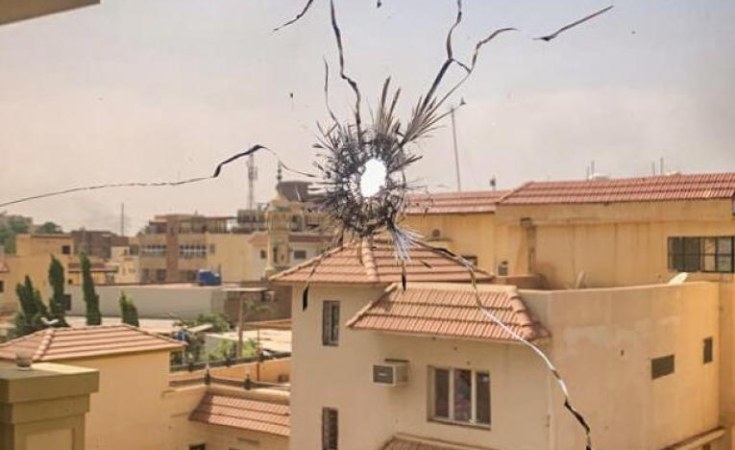United Nations — A senior U.S. official urged countries to stop supplying Sudan's rival generals with weapons for their civil war, saying they are fueling "death, destruction and depravity."
"A conflict that, as this report details, is being fueled by arms transferred from a handful of regional powers -- arms transfers that must stop," U.S. Ambassador to the United Nations Linda Thomas-Greenfield told reporters on Wednesday.
She was speaking of the final report of the five-member panel of experts on Sudan, who are mandated by the Security Council to report on the implementation of council sanctions. That report was published this week.
Thomas-Greenfield described the report's findings as "stomach-churning" and said it detailed "atrocity after atrocity after atrocity."
Fighting erupted in April last year between Sudan's army chief, General Abdel Fattah Burhan, and Mohamed Hamdan Dagalo, who commands the paramilitary Rapid Support Forces. The two generals were once allies in Sudan's transitional government after a 2021 coup but became rivals for power.
The 52-page report, completed in mid-January, says both the Sudanese Armed Forces (SAF) and the rebel Rapid Support Forces had the financial means to fund their war, noting they control most of the gold trade in Sudan.
While the SAF started the war in good economic shape, the panel found the group has lost control of some important economic sectors and companies and now relies in large part on wealthy businessmen to purchase military equipment for its troops.
The RSF funds its operations in part through fees it charges people for safe passage and to protect convoys passing through areas under its control in the Darfur region of Sudan, which has seen much of the fighting.
The RSF has also developed new supply lines for its fighters, smuggling weapons, ammunition, fuel and vehicles into Sudan through eastern Chad, southern Libya and South Sudan.
The panel found that from July onward, the RSF started using several types of heavy and sophisticated weapons that it did not have at the start of the war.
"This new RSF firepower had a massive impact on the balance of forces, both in Darfur and other regions of the Sudan," the panel wrote. "New heavy artillery enabled RSF to swiftly take over Nyala and El Geneina, while its new anti-aircraft devices helped to counter the main asset of SAF, namely, its air force."
The panel said that since June, various flight-tracking experts have observed numerous cargo planes originating from Abu Dhabi International Airport in the United Arab Emirates arriving at Amdjarass International Airport in eastern Chad, with stops in Kenya, Rwanda and Uganda. They said information they gathered substantiated media reports alleging the aircraft carried weapons, ammunition and medical equipment for the RSF.
The experts reached out to the UAE for a response. The government denied any involvement in the transfer of arms and ammunition, and said its flights transported humanitarian assistance for displaced Sudanese.
A similar panel request to Chad went unanswered.
In December, Sudan's U.N. envoy asked the Security Council to lift sanctions on government forces and impose an arms embargo against rebel forces.
"If you truly wish to safeguard peace and security in Darfur, there is a need to exclude the armed forces from the embargo imposed since 2004," Ambassador Al-Harith Idriss Al-Harith Mohamed said at the time.
The experts said the SAF has used aerial bombing and heavy shelling in urban areas in Darfur, causing a large-scale humanitarian crisis.
The U.N. human rights office says at least 14,600 people have been killed and 26,000 others injured, although the real toll is likely to be higher. In their report, the experts say at least 10,000 to 15,000 people have been killed in El Geneina alone.
The experts detailed horrific conflict-related sexual violence, particularly in Darfur by the RSF, which was often ethnically targeted against women and girls ages 9 to 75, often from the Masalit community. The panel said RSF snipers also indiscriminately targeted civilians, including pregnant women and young people, and their bodies were often left decomposing on roads for fear of being targeted while retrieving them.
On Wednesday, the World Food Program warned that the war could trigger the world's largest hunger crisis, with 25 million people across Sudan, South Sudan and Chad "trapped in a spiral of deteriorating food security."
Humanitarians cannot get enough food to civilians because of the insecurity and interference from the warring parties. WFP says 90% of people facing emergency levels of hunger in Sudan are largely in hard-to-reach areas.
The U.N. secretary-general will brief the Security Council when it meets on Sudan on Thursday.
Read the U.N. panel's full report here.


